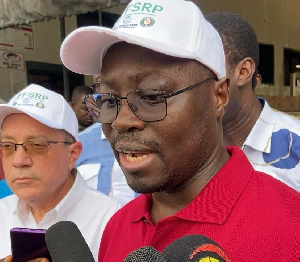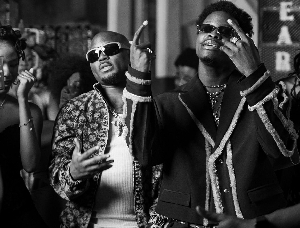By Dr Paul Amuna
One of my primary goals is to joggle our national consciousness with the view to a reawakening and realignment of our sense of identity as a nation and a people with a common destiny in the wise words and ambitions of ALL our founding leaders. This has characterized my contribution to our national dialogue which is NOT meant to glorify, promote or paint any one party (or individual) as better than others. As humans, we are all flawed and as we have seen in visual images recently circulating on the Social Media, even the ‘apparently most trusted, well-meaning’ people we hold in the highest regard and confidence in our society can sometimes perform the most despicable acts in the “name of religion, salvation, deliverance or god”.
In this feature, I am writing because my attention has been drawn to an article by Dr Kwame Okoampa-Ahoofe on Ghanaweb titled “Kwame Nkrumah and our Culture of Disrespect”(Ghanaweb Opinions, Thursday 10th December 2014). In his article, Okoampa-Ahoofe seeks to blame the late Osagyefo Dr Kwame Nkrumah, first president of the Republic, for the moral decadence and disrespect that we see in Ghanaian society today. In typical fashion, the writer does not mince his words, and goes for the jugular instead of leaving the dead to RIP. As far-fetched and comical as his discourse is, his analysis and assertions are both untrue and unfair, and indeed a sad reflection of the level of disrespect displayed across the spectrum and what I believe is counter-productive to our efforts to create a more convivial atmosphere for improving our rapidly declining moral state and deteriorating national dialogue at all levels, and especially in our politics.
At a time when many well-meaning Ghanaians wish to see us bury our differences, build solid bridges that bind us together and seek honest, serious and determined leadership and harmonised, concerted ways of addressing our national economic and developmental challenges, Okoampa-Ahoofe’s type of dialogue is most unhelpful and never a good thing for our democracy. One thing’s for sure, name calling, finger-pointing and the ‘blame game’ mentality will not help our cause and if anything (as in this case) further sets us apart.
As a student of contemporary political history, in responding to his grossly misleading piece, I wish to set the record straight on the issues upon which Dr Okoampa-Ahoofe seems to base his arguments namely that Kwame Nkrumah – 1) created division in the United Gold Coast Convention (UGCC) (which invited him to be their General Secretary in the lead up to our national independence); and 2) interfered with our traditional structures and in particular chieftaincy affairs which resulted (presumably) in a lack of respect and loss of the sense of hierarchy in our country. In his erroneous interpretation of what he perceives as the genesis of all things ‘disrespect’ in Ghana, he asserts that Dr Kwame Nkrumah (whom he persists in referring to as “Mr, Nkrumah” throughout his article, that in itself a mark of disrespect in my view) by these ‘acts’ somehow ‘sowed the seeds of discord’ which somehow have persisted and are responsible for our current moral decadence.
Nothing could be further from the truth. For all his faults, mistakes and failings as a human being and a leader (and I believe there were many), Dr Kwame Nkrumah was no different from anyone of us alive today or his peers at the time. But one thing I do know from studying him and his works (and I would challenge and encourage Dr Okoampa-Ahoofe to do likewise) is that he was consistent in his abhorrence of laziness, lack of endeavour, lack of respect, (yes respect) and moral and spiritual decadence.
To illustrate my point, permit me to quote just a single example from “Selected Speeches of Kwame Nkrumah” (Ch 26 p.162) compiled by Samuel Obeng (Afram Publications, 1979). In his May Day broadcast of April 30, 1963 in which he was making reference to national development projects, president Nkrumah had this to say to Ghanaians:
“But what is all this advancement for, if we do not support or sustain it with a strong moral and spiritual foundation? If we combine moral degeneration with technological and scientific progress, Ghana will surely fail. This of course has been the lesson of history. Look at the temperament, attitude towards work, honesty and integrity of the men and women of any people, and you have a good indication how low or how high is the moral or spiritual quality of the nation”. (underlined by me for emphasis).
Isn’t it ironic that today, with technological and scientific advancement, we have the internet which allows for social media such as the one we all use here and rather than use it to advance our cause as a nation, we are FAILING even in our discourse? Talk of a prophecy fulfilled!!!
Clearly Dr Nkrumah was concerned about our moral state as a nation which contrary to Okoampa-Ahoofe’s misleading assertion I hasten to add, he was certainly NOT the ‘architect’ of. On the contrary, he recognised how crucially our moral situation, our attitude to work and our dedication to our national cause would not only define us, but serve as an important yardstick for measuring what we can achieve over time – i.e. our national development!!! This is but one example of Nkrumah’s own observations, admonition and lamentation on the course of the new and fledgling nation, Ghana and this deep feelings and the passion that permeated most things that he did. This approach was a consistent feature of his speeches, actions, including e.g. matters of discipline (or indiscipline) and how he dealt with them in his own cabinet and party.
On the matter of chieftaincy affairs, perhaps Dr Okoampa-Ahoofe would care to read the chapter in “Africa Must Unite”, by Kwame Nkrumah and published by Panaf Books (1963) in which, having undertaken and analysis of our traditional systems, he sought to emphasize the importance of chieftaincy in Ghana and to justify the establishment of the National House of Chiefs as an important (if you like) traditional wing of our governance across our villages, towns, etc. and contributing to national affairs.
I do believe Dr Okoampa-Ahoofe like me, grew up in Ghana at a time when there was a sense of discipline and utmost respect for our peers, teachers, neighbours and elders. Those were the days when you could be disciplined by an older neighbour, then reported to your parents for bad behaviour. Surely these were core values which we grew up with at the time, and which have thankfully remained with some of us to this day. We also seek to inculcate the same core values in our own children and in forums such as this one, we seek to remind each other of those solid foundations, and in Nkrumah’s own words, to ask our fellow Ghanaians including Dr Okoampa-Ahoofe “what is all this advancement for, if we do not support or sustain it with a strong moral and spiritual foundation?
I will conclude by reminding us again in the Osagyefo Dr Nkrumah’s words that “If we combine moral degeneration with technological and scientific progress, Ghana will surely fail”. My fellow Ghanaians, the causes of our moral decadence are protean, some more obvious than others, but Okoampa-Ahoofe’s ill-informed ‘theory’ is certainly not one of them. Instead of being taken in by his ridiculous, erroneous assertions I rather suggest we heed the advice of the Osagyefo Dr Kwame Nkrumah, the very person whose image, standing on moral issues and work he seeks here to discredit.
Opinions of Friday, 12 December 2014
Columnist: Amuna, Paul














